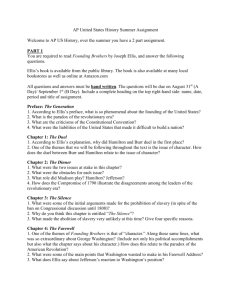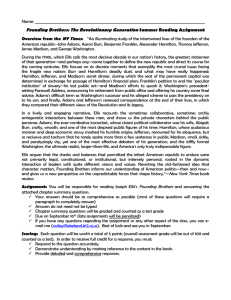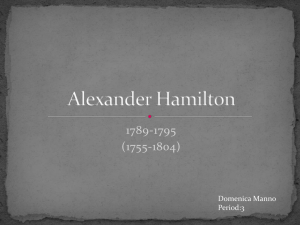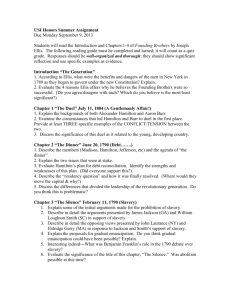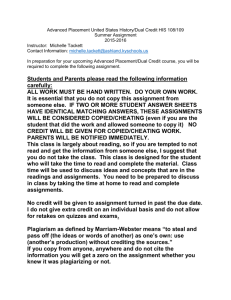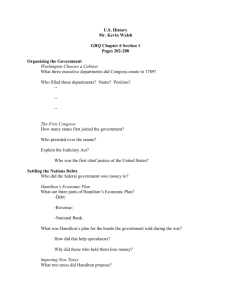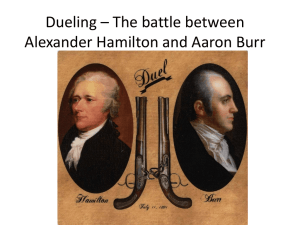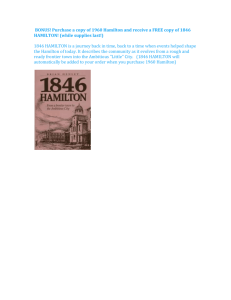Founding Brothers:
advertisement
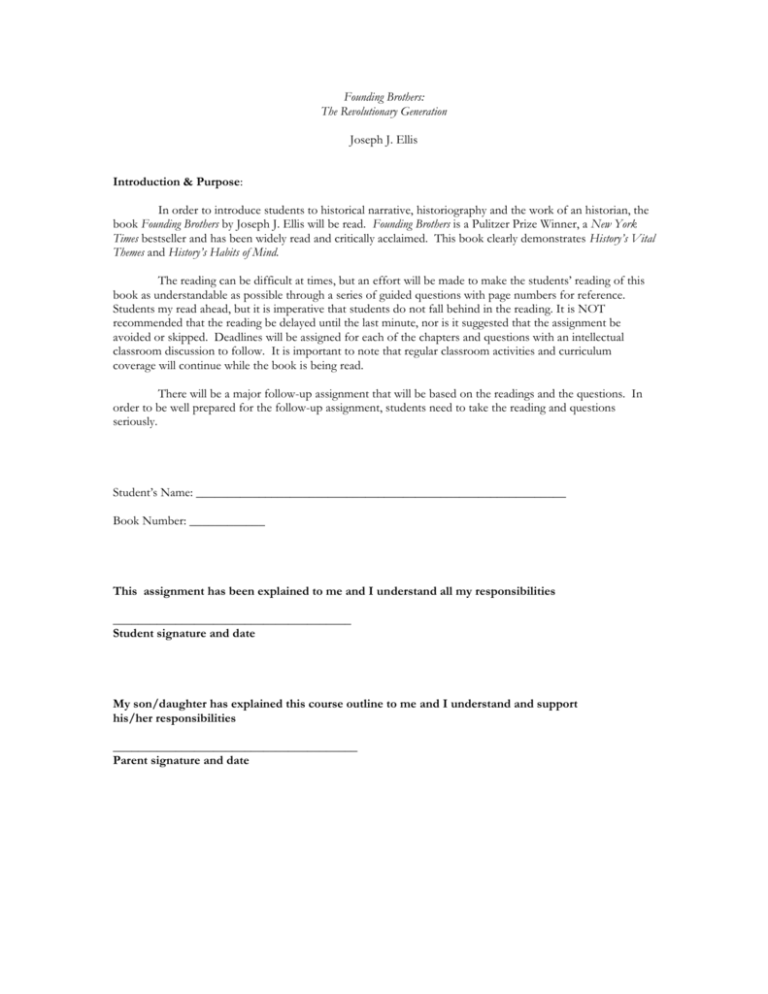
Founding Brothers: The Revolutionary Generation Joseph J. Ellis Introduction & Purpose: In order to introduce students to historical narrative, historiography and the work of an historian, the book Founding Brothers by Joseph J. Ellis will be read. Founding Brothers is a Pulitzer Prize Winner, a New York Times bestseller and has been widely read and critically acclaimed. This book clearly demonstrates History’s Vital Themes and History’s Habits of Mind. The reading can be difficult at times, but an effort will be made to make the students’ reading of this book as understandable as possible through a series of guided questions with page numbers for reference. Students my read ahead, but it is imperative that students do not fall behind in the reading. It is NOT recommended that the reading be delayed until the last minute, nor is it suggested that the assignment be avoided or skipped. Deadlines will be assigned for each of the chapters and questions with an intellectual classroom discussion to follow. It is important to note that regular classroom activities and curriculum coverage will continue while the book is being read. There will be a major follow-up assignment that will be based on the readings and the questions. In order to be well prepared for the follow-up assignment, students need to take the reading and questions seriously. Student’s Name: ___________________________________________________________ Book Number: ____________ This assignment has been explained to me and I understand all my responsibilities ______________________________________ Student signature and date My son/daughter has explained this course outline to me and I understand and support his/her responsibilities _______________________________________ Parent signature and date Questions for The Generation Pages 3-19 Pages 3-4 According to Ellis, how is the American Revolution improbable and, at the same time, inevitable? Pages 4-6 Ellis writes, “The old adage applies: Men make history, and the leading members of the revolutionary generation realized they were doing so, but they can never know the history they are making (4).” Explain what Ellis means by this statement using evidence from the book. What advantage does hindsight give us when studying history? Give examples. Pages 6-9 In dealing with being farsighted and nearsighted, why are the farsighted prospects of a great continent the same factors that gave nearsighted problems? How can both interpretations of the nearsighted vision be correct? Pages 9-12 What is considered the second phase of the American Revolution? Why? What was the view of an “American?” How was the term used? In 1789, what were the odds of this nation lasting? Give the pros and cons as Ellis outlines them. Why does Ellis claim that these founding decades were the most crucial and most consequential (even more so than the Civil War and World War II)? Pages 12-13 What has been the trend concerning the study of the Founders? Why does Ellis feel the need to defend his choice of writing this book on the political history of the early republic? Pages 13-15 Ellis claims there are two ways to tell the story of the Revolution. Explain each. Pages 15-16 Explain what Ellis means when he says that the battle for historians and others – even of that generation – is over the “true meaning” of the American Revolution. Pages 17-19 What common themes does Ellis Claim each of his stories encompasses? Why does he choose to put the duel between Hamilton and Burr first? Questions for The Duel Pages 20-47 Pages 20-23 Describe Hamilton’s background. Describe Burr’s background. Pages 23-25 Where did this duel take place? Why was this duel called “an interview?” What is the code duello? Describe the code. How did a duel unfold? – Describe. Page 25-27 What is the popular consensus on what happened? Pages 27-31 What is the controversy? What facts can be agreed upon? What is the Burr version of what happened? What is the Hamilton version of what happened? What really happened? How does this relate to History’s Habits of Mind # 7… prepare to live with uncertainties and exasperating, even perilous, unfinished business realizing that not all problems have solutions. Page 31-35 What events forced Hamilton and Burr to the duel? Be specific. – offensive words, specific offenses, etc. Why wasn’t the “apology” accepted? Page 35-38 Why was this disagreement/ argument between Hamilton and Burr an exception in that it led to a duel? What was unique about the dinner party on July 4th? Why was Burr there (at the duel)? Why was Hamilton there? Why couldn’t Hamilton just refuse to duel? Page 38-43 Why was Hamilton’s criticism of Burr much more brutal that the criticism Hamilton made of his chief political rival, Thomas Jefferson? Why is it acceptable to just call this event “The Duel” without fear of having this event confused with other duels? What political rivalries did the two have? Hamilton called Burr the Cataline of America. To what degree is this ‘name calling’ offensive? Pages 44-47 When Burr decided to switch parties and run for governor of New York, why did Hamilton see this act as being dangerous? What similarities are there between Hamilton and Burr? Why is public and personal criticism so important to Hamilton in his critique of Burr? Why is this duel so important? (Why does Ellis choose this event?) After reading this chapter: Identify a Vital Theme for this Chapter. Identify 2 or more Habits of Mind Ellis used in writing this chapter – briefly explain where he used each Habit Questions for The Dinner Pages 48-80 Pages 48-52 What was Hamilton’s plan? Who was blocking it? What was Jefferson’s plan? Why is his account so important? How is it “self-serving?” What was the deal that Jefferson supposedly brokered at the dinner in June of 1790? Is it true? Provide evidence for your answer. Pages 52-54 Ellis chooses to discuss Madison first. Why is Madison so important in this story – be specific. Pages 54-55 What is the relationship between Madison and Jefferson? Hamilton and Madison? Pages 55-58 What changed Madison’s thinking? What was Hamilton’s proposal concerning the funding of the domestic debt? What was actually happening to the original holders of government securities (mostly soldiers of the Revolution)? What was Madison’s response to this part of Hamilton’s plan? What was the second part of Hamilton’s proposal? Why was Madison against it? Pages 58-60 Why was Madison being accused from “both sides” on this issue of assumption? Pages 60-62 What was Hamilton’s thinking on his financial plan? What was his disagreement with Madison on the funding of the debt and payment to the soldiers? What was his disagreement with Madison on assumption? Pages 62-65 Ellis claims Hamilton’s plan can be seen as a reflection of his personality and state of mind in 3 ways: 1) Hamilton’s view of the use and control of national resources – unleash them, but let the government mange them and the US will be extremely powerful Who was Hamiton’s model for this thinking? Why would many oppose this thinking? 2) Hamilton’s view of economic power and money How was his view of debt different than that of Madison’s? 3) Hamilton’s view of the elite How is Hamilton’s view of wealth different than that of Madison’s (and other Virginians’)? Pages 65-68 What is Jefferson’s background? What was Jefferson’s attitude toward argument? Why was securing America’s financial status so important to Jefferson as Secretary of State? Pages 69-72 What was, in addition to Hamilton’s financial plan, a major source of disput for the new government? What was a “likely” spot for the capital? Where did Madison want the capital to be? Pages 72-76 Why would Pennsylvanians agree to Philadelphia as a temporary capital and the Potomac being permanent? How is Jefferson’s version of the dinner distorting? What, most likely, happened at the dinner? Why was the Potomac such a controversial site and the topic of many jokes? How did many suggest that the location for the capital be chosen? How does this story fit with the location of the White House being at 1600 Pennsylvania Avenue? Pages 76-80 What was Virginia’s hidden threat if assumption were to pass? Why is the dinner compromise so important according to Ellis? How many different forces were at play? Be specific. By choosing the Potomac as the site, what did the US do that no other powerful European ever did? Why was the Potomac so important to Jefferson and Madison despite the fact that they had to give in to Hamilton’s proposal? After reading this chapter: Identify a Vital Theme for this Chapter. Identify 2 or more Habits of Mind Ellis used in writing this chapter – briefly explain where he used each Habit.
